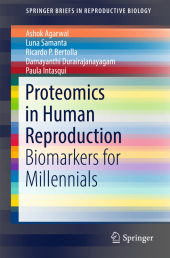 Neuerscheinungen 2016Stand: 2020-02-01 |
Schnellsuche
ISBN/Stichwort/Autor
|
Herderstraße 10
10625 Berlin
Tel.: 030 315 714 16
Fax 030 315 714 14
info@buchspektrum.de |

Ashok Agarwal, Ricardo P. Bertolla, Damayanthi Durairajanayagam, Paula Intasqui Lopes, Luna Samanta
(Beteiligte)
Proteomics in Human Reproduction
Biomarkers for Millennials
Mitarbeit: Agarwal, Ashok; Samanta, Luna; Bertolla, Ricardo P.; Durairajanayagam, Damayanthi; Intasqui Lopes, Paula
1st ed. 2016. 2016. xv, 124 S. 9 SW-Abb., 4 Farbtabellen. 235 mm
Verlag/Jahr: SPRINGER, BERLIN; SPRINGER INTERNATIONAL PUBLISHING 2016
ISBN: 3-319-48416-8 (3319484168)
Neue ISBN: 978-3-319-48416-7 (9783319484167)
Preis und Lieferzeit: Bitte klicken
This Brief explores the use of proteomics as a tool for biomarker discovery in human reproduction and summarizes current findings and trends of proteomic studies in both male and female infertility. This simplifies this important but complex topic and equips the novice reader with sufficient background information on the use of proteomics in human reproduction. The up-to-date scenario on proteomic investigations will also appeal to researchers and post graduate students looking to keep abreast with the latest developments in reproductive research. This review summarizes current findings of contemporary proteomic studies on infertility in both males and females with various reproductive pathologies, and its use in predicting the outcome of assisted reproduction. In human reproduction, the search for biomarkers via proteomics is a fast-evolving approach that involves the analysis of proteins in the reproductive tissues and fluids, such as the male gametes, seminal plasma, ovarian and endometrial tissue, and follicular and uterine fluid. By comparing the protein profile of a healthy, fertile individual against that of an infertile individual, the differentially expressed proteins may give an indication to certain proteins that could serve as useful biomarkers that are related to infertility. As proteomic studies continue to unravel the dynamic proteome behind various infertility conditions, there is potential for the discovery of prognostic markers that could ultimately help in both natural and assisted human reproduction.
Introduction.- Proteomics.- Proteomics and Male Infertility.- Role of Proteomics in Female Infertility.- Proteomics in Assisted Reproduction.- Challenges of Proteomic Studies in Human Reproduction.- What Does the Future Hold?.- Conclusions.


